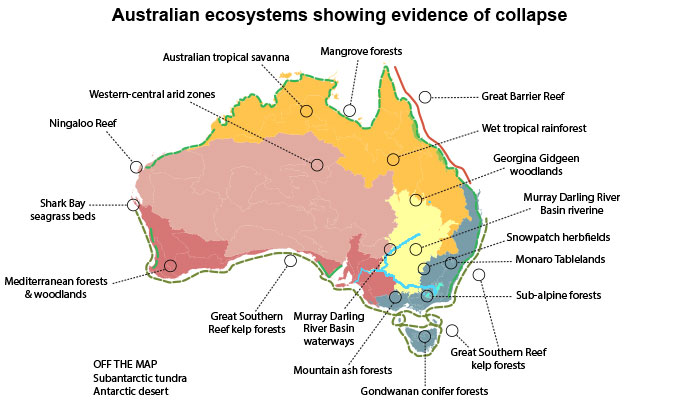A landmark study published today in the international journal Global Change Biology has issued a stark warning of transformational change occurring in Australian ecosystems.

Clear and present danger: The Great Barrier Reef is one of 19 eco-systems around Australia identified in a new report that are in danger of collapse. Image credit: Nicolas Rakotopare.
Titled “Combating ecosystem collapse from the tropics to the Antarctic” the paper is a collaboration between 38 Australian, UK and US scientists from universities and government agencies, including Distinguished Professor Lesley Hughes from Macquarie University.
The study documents the current state and recent trajectories of 19 marine and terrestrial ecosystems across all Australian states, spanning 58° of latitude across 7.7 million km2 from tropical coral reefs to Antarctica.
The collapses are happening in some regions that are also critical for growing food such as the Murray Darling River Basin, and in vital water catchments such as Victoria’s Mountain Ash Forest, putting the clean drinking water for millions of people at risk.
The 19 ecosystems include the Great Barrier Reef, mangroves in the Gulf of Carpentaria, the arid zone of central Australia, Shark Bay seagrass beds in Western Australia, Great Southern Reef kelp forests, Gondwanan conifer forests of Tasmania, Mountain Ash forest in Victoria, and moss beds of East Antarctica.
Extreme events take some of the blame
Each of these ecosystems is undergoing some form of collapse, defined as potentially irreversible change to ecosystem structure, composition and function. While none of the ecosystems has collapsed across its entire range, there is evidence of local collapse in each, driven by pressures such as climate change (especially increases in the severity and frequency of extreme events such as fires, floods, heatwaves, storms and droughts), habitat loss, invasive species, and over-exploitation for human uses.
In some cases, the observed collapses have occurred very rapidly, over months to a few years, whereas in others the changes have been occurring progressively over many decades. In most cases, the ecosystems are suffering from multiple pressures simultaneously.
The authors concluded that in the near future, even apparently resilient ecosystems are likely to suffer collapse as the intensity and frequency of pressures increase.

Under threat: seven of the 19 ecosystems identified in the study are in World Heritage areas. Map credit: Mary Cryan.
The study found that protected areas are not immune to collapse, with ten of the threatened ecosystems occurring under international or national management systems, and seven occurring within World Heritage Areas.
The documented collapses are happening in some regions that are also critical for growing food such as the Murray Darling River Basin, and in vital water catchments such as Victoria’s Mountain Ash Forest, putting the clean drinking water for millions of people at risk.
Three ways to fight eco-collapse
The paper recommends a new ‘3As’ framework to guide decision-making about actions to combat the documented damage:
- Awareness of the importance of the ecosystem and the need for its protection;
- Anticipation of the risks from current and future pressures
- Action on reducing the pressures to avoid or lessen their impacts
Specific management actions to halt and reverse the decline are identified for each of the 19 ecosystems.
Professor Hughes urges stronger and more interventionist action before it’s too late.
“These ecosystems have been subject to many threats, including habitat loss and invasive species, but now climate change is rapidly exacerbating the problems, putting ecosystems like the Great Barrier Reef in danger of such drastic transformation that recovery may be impossible,"she says.

Time to act: Distinguished Professor Lesley Hughes, pictured, says the new research should be a wake up call for Australians that measures to fight ecosystem collapse are needed now.
She hopes that “this paper will be a wake-up call for all Australians that value the natural environment and the services it provides. Without significant environmental investment, far stronger environmental protection, and rapid reduction of greenhouse gas emissions, the ecosystems that many now take for granted may disappear completely within the next decade.
As the plants and animals that live in these habitats decline, the services the ecosystems provide, underpinning our economic livelihoods, our health and well-being, will disappear. Ultimately, these thus transformations threaten our own survival”.
Distinguished Professor Lesley Hughes is the Deputy Vice Chancellor (Research, Integrity and Development) at Macquarie University and Professor of Biological Science.



